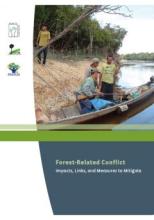Land Library
Bienvenido a la biblioteca de Land Portal. Explora nuestra amplia colección de recursos de acceso abierto (más de 74.000), que incluye informes, artículos de revistas científicas, trabajos de investigación, publicaciones revisadas por pares, documentos jurídicos, vídeos y mucho más.
/ library resources
Showing items 1783 through 1791 of 1862.Should market efficiencies or social objectives drive the design of Payment for Environmental Services (PES) schemes?
The scale of REDD is one of the most important issue being discussed in the ongoing REDD debate. Three options exist: national, sub-national and a nested approach.
In Vietnam, the lack of quality data in the forestry sector has been an obstacle to institutional reflection and effective policy formulation. This study analyzes the status and gaps of this data, and its implications for addressing poverty in Vietnam.
The year 2007–2008 was the final year of the RECOFTC Program Phase 2004–2008. We are pleased to report that the four-year Program Plan was successfully implemented on time, and we fulfilled all the major remaining commitments, even exceeding targets in some areas.
Forest-based conflict is one of the major global challenges for the international forestry agenda together with poverty, climate change, conservation, and biofuels.
"I believe that the work of RECOFTC is of greater importance now than any time in its 20 year history.
This study is part of a project implemented by the Regional Community Forestry Training Center for the Asia and Pacific (RECOFTC) in collaboration with the Rights and Resources Group (RRG) to advance policy and market reforms in four countries: Cambodia, Lao PDR, Thailand, and Viet Nam.
Opportunities for forest managers to gain knowledge and skills in participatory resource management processes are still limited.
Under present and foreseeable economic and social trends in the Asia-Pacific region, can we achieve sustainable forest management and better realize the potential of forests and forestry to contribute to improved human well-being?









